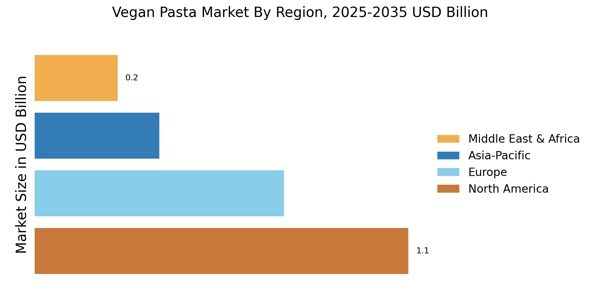Diverse Product Offerings
The Vegan Pasta Market is characterized by a remarkable diversity in product offerings, which serves as a significant driver of growth. Manufacturers are innovating to create a wide range of pasta types, including gluten-free, high-protein, and organic options. This variety caters to different dietary preferences and restrictions, appealing to a broader audience. Market data reveals that the introduction of unique flavors and ingredients, such as spinach or beetroot-infused pasta, is gaining traction among consumers. This diversification not only enhances consumer choice but also encourages trial and repeat purchases, thereby bolstering the Vegan Pasta Market. As brands continue to innovate, the potential for market expansion remains substantial.
Health Benefits of Vegan Pasta
The increasing awareness of health benefits associated with plant-based diets appears to be a primary driver for the Vegan Pasta Market. Consumers are increasingly seeking alternatives to traditional pasta that are lower in carbohydrates and higher in fiber. Research indicates that plant-based diets can reduce the risk of chronic diseases, which resonates with health-conscious individuals. The Vegan Pasta Market is witnessing a surge in demand for products made from lentils, chickpeas, and other legumes, which are not only nutritious but also provide a satisfying texture. This shift towards healthier eating habits is likely to propel the market forward, as more consumers opt for vegan pasta as a staple in their diets.
Convenience and Ready-to-Eat Options
The demand for convenience in food choices is increasingly influencing the Vegan Pasta Market. Busy lifestyles have led consumers to seek quick and easy meal solutions, and vegan pasta products that offer ready-to-eat options are gaining popularity. The market data indicates that pre-packaged vegan pasta meals are becoming a preferred choice for many, as they provide a nutritious and hassle-free dining experience. This trend towards convenience is likely to drive innovation within the Vegan Pasta Market, as brands strive to meet consumer needs for both quality and ease of preparation. The potential for growth in this segment appears promising, as more consumers prioritize convenience in their food choices.
Rising Veganism and Plant-Based Diets
The increasing adoption of veganism and plant-based diets is a pivotal driver for the Vegan Pasta Market. As more individuals transition to plant-based lifestyles for ethical, health, or environmental reasons, the demand for vegan products, including pasta, is likely to rise. Data indicates that the number of people identifying as vegan has grown significantly, leading to a corresponding increase in the availability of vegan food products. This trend suggests that the Vegan Pasta Market is well-positioned to benefit from the growing consumer base seeking convenient and delicious plant-based meal options. The potential for market growth is substantial as more consumers embrace veganism.
Sustainability and Environmental Concerns
Sustainability has emerged as a crucial factor influencing consumer choices, particularly in the Vegan Pasta Market. As awareness of environmental issues grows, consumers are increasingly inclined to choose products that align with their values. Vegan pasta, often produced with fewer resources and lower carbon footprints compared to traditional pasta, appeals to eco-conscious consumers. The market data suggests that the demand for sustainable food options is on the rise, with a notable percentage of consumers willing to pay a premium for environmentally friendly products. This trend indicates a potential for growth in the Vegan Pasta Market, as brands that emphasize sustainability in their production processes may attract a loyal customer base.

















